Landscaping Chalk Farm: Transforming Your Outdoor Space
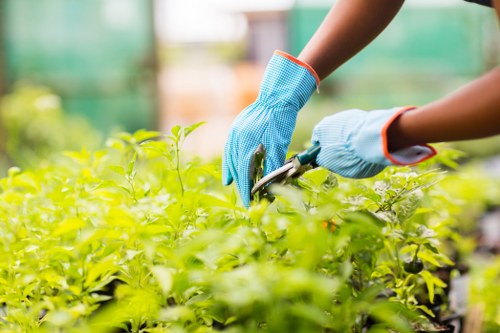
Chalk Farm, located in the heart of London, is renowned for its vibrant community and eclectic atmosphere. When it comes to landscaping Chalk Farm, homeowners and businesses alike seek to enhance their outdoor spaces, making them both aesthetically pleasing and functional.
Whether you are looking to create a serene garden retreat, a modern patio, or a lush green lawn, understanding the unique aspects of landscaping in Chalk Farm is essential. This guide will walk you through the best practices, key considerations, and local expertise needed to achieve stunning results.
From selecting the right plants to designing efficient irrigation systems, landscaping Chalk Farm involves a blend of creativity and practicality. Let’s delve into the various elements that make landscaping in this area unique and how you can apply them to your own space.
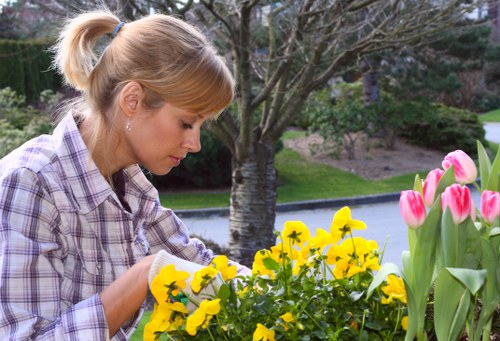
Understanding the Climate and Soil in Chalk Farm
Chalk Farm experiences a temperate climate, characterized by mild winters and warm summers. This climate influences the types of plants that thrive in the area, making it important to choose greenery that is resilient and well-suited to local conditions.
The soil in Chalk Farm is typically chalky, which affects drainage and nutrient availability. To ensure a healthy garden, it's crucial to amend the soil with organic matter and consider using raised beds for better control over soil quality.
Proper soil preparation is the foundation of successful landscaping. Testing your soil’s pH and nutrient levels can help you determine the best plants and fertilizers to use, ensuring your garden flourishes throughout the year.
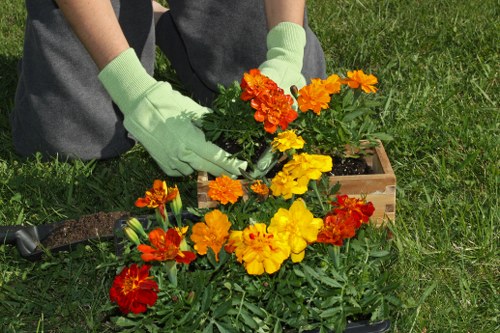
Choosing the Right Plants for Your Landscape
Selecting plants that are native or well-adapted to the Chalk Farm environment can significantly reduce maintenance efforts and enhance the sustainability of your garden. Consider a mix of perennials, shrubs, and trees that provide year-round interest.
- Perennials: Lavender, Echinacea, and Hostas are excellent choices for adding color and texture.
- Shrubs: Boxwood, Hydrangeas, and Azaleas offer structure and can serve as focal points.
- Trees: Oak, Maple, and Japanese Maple provide shade and vertical interest.
Incorporating a variety of plant types ensures a dynamic and engaging landscape that changes with the seasons.
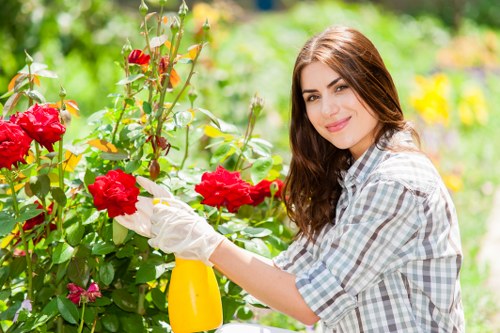
Designing Functional Outdoor Spaces
Effective landscaping in Chalk Farm isn’t just about beauty; it also involves creating spaces that serve practical purposes. Consider the following elements:
- Patios and Decks: Provide areas for relaxation and entertainment.
- Paths and Walkways: Enhance the flow of your garden and guide visitors through different zones.
- Water Features: Add a sense of tranquility with fountains, ponds, or waterfalls.
By thoughtfully designing these elements, you can create a landscape that is both beautiful and functional, catering to your lifestyle needs.
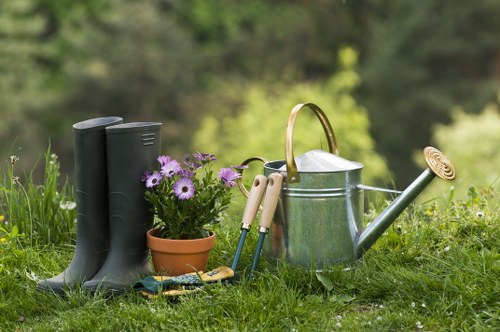
Incorporating Sustainable Practices
Sustainability is a key consideration in modern landscaping. Implementing eco-friendly practices not only benefits the environment but also reduces long-term maintenance costs.
Here are some sustainable landscaping tips for Chalk Farm:
- Rainwater Harvesting: Collect and use rainwater for irrigation to conserve water resources.
- Native Plants: Use plants that are adapted to the local climate, which require less water and care.
- Composting: Recycle garden waste to create rich compost that enhances soil fertility.
Adopting these practices ensures a resilient and environmentally friendly landscape.
In addition to plant selection and design, lighting plays a crucial role in landscaping Chalk Farm. Proper lighting can highlight key features of your garden, provide safety, and extend the usability of outdoor spaces into the evening hours.
Consider using energy-efficient LED lights and solar-powered fixtures to minimize electricity usage. Pathway lights, spotlights for trees, and ambient lighting for seating areas can create a warm and inviting atmosphere.
Maintenance is another important aspect of landscaping. Regular tasks such as pruning, weeding, and fertilizing keep your garden healthy and looking its best. Investing time in upkeep ensures that your outdoor space remains a source of pride and enjoyment.
For those seeking professional assistance, there are numerous landscaping services available in Chalk Farm. These experts can provide personalized advice, design custom layouts, and handle installation and maintenance tasks. Partnering with a local landscaper ensures that your garden is tailored to the specific conditions and aesthetic preferences of the Chalk Farm area.
In conclusion, landscaping Chalk Farm offers endless possibilities for creating beautiful and functional outdoor spaces. By understanding the local climate and soil, choosing the right plants, designing with purpose, and embracing sustainable practices, you can transform your garden into a vibrant sanctuary.
Nearby Areas to Chalk Farm for Landscaping Inspiration
Expanding your landscaping project to include ideas from nearby areas can bring diverse styles and techniques into your own garden. Here are some of the closest areas to Chalk Farm that offer unique landscaping features:
- Camden Town: Known for its eclectic urban gardens and vibrant plant selections.
- Primrose Hill: Offers stunning views and manicured lawns ideal for formal garden designs.
- Regent's Park: Features expansive green spaces and expertly maintained flower beds.
- Hampstead: Renowned for its historic gardens and classic landscaping styles.
- Kentish Town: Combines modern and traditional elements in its outdoor spaces.
- Swiss Cottage: Emphasizes sustainable gardening and eco-friendly practices.
- Bloomsbury: Showcases elegant and sophisticated garden layouts.
- Frognal: Offers serene and tranquil garden designs with a focus on relaxation.
- Pimlico: Integrates urban landscaping with green pockets and rooftop gardens.
- Islington: Blends contemporary and classic garden elements seamlessly.
Frequently Asked Questions
1. What are the best plants for a Chalk Farm garden?
Choosing plants that thrive in a temperate, chalky soil environment is crucial. Some excellent options include lavender, echinacea, hostas, boxwood, hydrangeas, and Japanese maple trees.
2. How can I make my landscaping more sustainable?
Implementing practices such as rainwater harvesting, using native plants, and composting garden waste can significantly enhance the sustainability of your landscaping.
3. Do I need a professional landscaper for my Chalk Farm garden?
While DIY landscaping is possible, hiring a professional landscaper can provide personalized designs, expert advice, and efficient installation, ensuring the best results for your outdoor space.
4. What maintenance is required for a Chalk Farm garden?
Regular maintenance includes pruning, weeding, fertilizing, and monitoring soil health. Proper upkeep ensures that your garden remains healthy and visually appealing throughout the year.
5. How can I incorporate lighting into my landscaping?
Using energy-efficient LED or solar-powered lights can highlight key garden features, provide safety, and create a warm atmosphere for evening use. Pathway lights, spotlights, and ambient lighting are great options.




